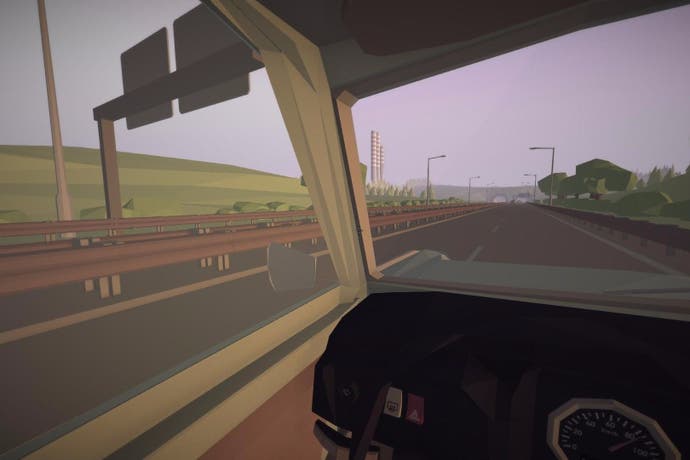The rebellious rise of road trip games
The one less travelled by.
Have you ever noticed that driving games are all a bit samey? Whether it's Formula 1 or Forza, the emphasis never changes. They're all about speed and success, a relentless, testosterone-fuelled drive toward dominance. Drive in enough circles in your gleaming, sleekly lined car, and eventually you'll be rewarded with an even sleeker, gleamier car.
So the cycle continues in this fashion, fanning the player's ego with points and prestige, without ever actually taking them anywhere. Conservatism is so firmly entrenched in driving games that even the outliers of the genre, like the ferociously challenging Dirt Rally, or the blissfully batshit Burnout, are built upon the same fundamental principles.
If you've ever realised this whilst playing a driving game, then imagine what it must be like for the developers who make them, spending months and years working on a project that is scarcely any different from their last. "I noticed a while ago that I really am not that fond of driving, unless I'm headed somewhere I've not been before," says Greg Prjmachuk, a developer who worked on Codemasters' Formula 1 franchise from 2009 to 2014. "I started to notice the parallels of commuting to work with working on the same game year on year. You can't but help notice the joy fading."
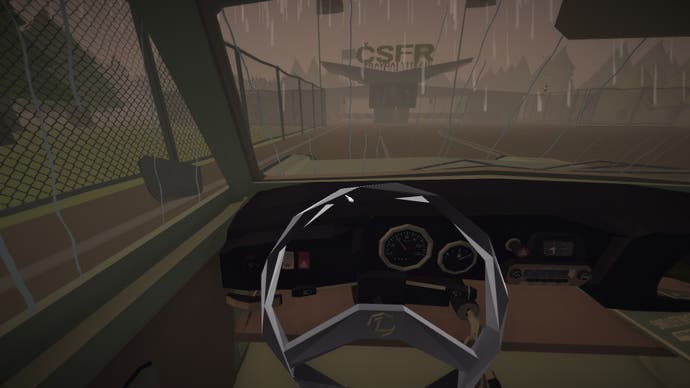
Tired of feeling as if he was going in circles himself, three years ago Pryjmachuk quit his job, and began working on a game that is the antithesis of everything that mainstream racers hold dear. "I decided to ignore what I consider the uniform aspects of racing games, the competitive nature, learning of circuit layouts, wrestling with licensing issues," he says. "What I ended up was a game about driving a fictional interpretation of the much famed Trabant across European countries during a time of great change."
That game is Jalopy, and it couldn't be any farther removed from the core tenets of traditional racers. Its texture-less, pastille-painted environments are simplistic and yet artful, a world away from the pornographic uniformity of the racing genre. Its locations are not the glittering opulence of Monaco or the snow-dusted forests of Sweden, but the farthest tendrils of the USSR. It focuses not on victory and prestige, but on freedom and adventure, celebrating the joys and the dangers of the open road.
Most of all though, it's about one terrible, delightful car. From the industrial heartland of East Berlin to the fringes of Soviet Europe in Istanbul, your grand journey East is undertaken using just one vehicle. The Laika 601 Deluxe is Jalopy's fictitious interpretation of the ubiquitous German Trabant. It is in this chugging and spluttering bucket of bolts where the seeds of Pryjmachuk's rebellion are buried.
"You look at much bigger budget games, and they're offering all kinds of vehicles to meet back of the box features," he says. "The thing is, I always find they don't differ from one another as much as you see in, say, car review television. You get all these cars, but none of them have the unique quirks with what makes them so great or so terrible. By focusing on the Laika (Jalopy's only drive-able car) I could concentrate on making the little car seem like it's special own thing."
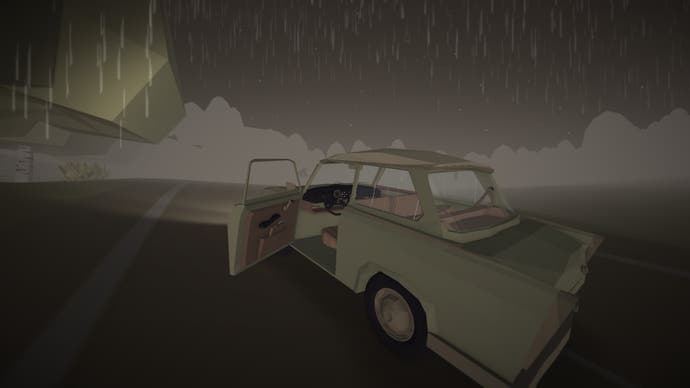
Jalopy's jalopy is far more than a means to get you from A to B. It is a companion on your journey whom you must care for and keep safe, and in return it will get you where you need to go. You establish your relationship with the Laika by putting it together yourself, constructing the engine out of component parts, fitting the wheels to the axle, learning how to refuel and, most importantly, stave off wear and tear.
Despite its lighthearted aesthetic and tone, Jalopy is not a casual experience. The vital importance that Jalopy places upon your Laika is matched only by the many ways in which it can fall apart. Your starting components are underpowered and unreliable, easy prey for a rough road, poor weather conditions, or even a steep incline. If your car breaks down in Jalopy's abstract portrayal of Eastern Europe, you have two choices. If you've saved some money from selling contraband you've found on the roadside, you can trudge back to the nearest town and get the parts you need. If you don't, then you can only start your trip over, and learn from your mistakes.
"During the journey, you're having the player do some mental juggling with what they need to keep in mind next," Pryjmachuk explains. "How much fuel they have, are their tyres going to keep up? Will the cigarettes I'm hauling sell better here or in the next town? Will I need to get a new set of tyres if the next leg of the journey has terrible weather or road conditions? With this in mind, Jalopy feels more like a simulation and management game, rather than a straight up driving game."
You might think that Jalopy is a one-off, an intriguing curio from a reinvigorated developer. But this couldn't be farther from the truth. In fact, Jalopy is the parade-vehicle for an emerging new genre of driving game - the road trip sim. Right now, you will only see a handful of these games pootling about the virtual roads, but more are appearing each year, and you can see elements of the idea in other games too.
Road trip games are characterised by how they embrace the freedom to explore that a car provides, usually tempered in some way by the mechanical realities of owning one. They combine the enthusiastic realism of Euro Truck Simulator with the adventurous spirit of Final Fantasy 15. What's more, each comes with its own eccentricities. Finji's Overland is a hardcore survival sim viewed from an isometric perspective, in which you travel through post-apocalyptic America in a creaking hatchback, while Wheel of Aurelia adapts the road trip theme to interactive fiction, focussing on conversations between passengers as you race through the vibrant Italian countryside.
But perhaps the most extreme example of this emerging trend is My Summer Car. Developed by Finnish husband and wife duo Amistech games, My Summer Car tasks you with travelling around the Finnish countryside doing odd jobs for people, earning enough money to build your dream car (which is of course a hatchback from the early 90s).
This may not sound like the most exciting premise, but what makes My Summer Car fascinating is the polarised nature of its personality. On the one hand, it is an astonishingly hardcore car-building simulator, with a mind-boggling number of components you need to piece together and no direct instruction on how to do so. But it's also a game that embraces anarchy and silliness, almost encouraging reckless drink-driving, and sporting several controls dedicated entirely to swearing.
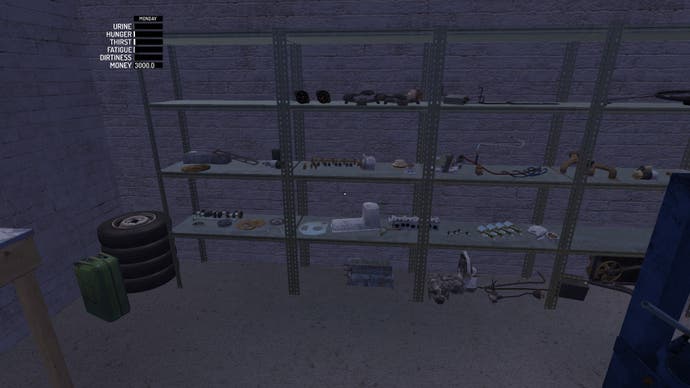
Like Jalopy, my summer car blends elements of serious driving sims and survival games. But the origins of My Summer Car are much more straightforward. "I wanted to have [a] car game that truly punishes the player from bad decisions," says Johannes Rojola. "There were no exact sources of inspiration, but I always loved Street Rod games. There is a lot similarities with those in My Summer Car."
My Summer Car is certainly an uncompromising game, you only need to glance at the bamboozling number of car parts in your character's garage to see that. Even the game's sillier elements, namely the drinking and swearing, can lead to fatal consequences on the road. But there's another reason behind the game's zealous commitment to vehicular realism. "I do not think that cars in games can exist in a vacuum," Rojola explains. "I want to see real purposes for having cars in games. Cars are utility vehicles and if they are not used as such I do not know why they would even exist."
As such, My Summer Car is set in a large chunk of remote Finnish countryside, where walking from place to place is simply impractical. Indeed, while you might not think it from watching the trailers, pragmatism is a huge factor in My Summer Car's development. Rojola chose Finland as the location because he is familiar with it, and the reason the game is set in the 90s, rather than the modern day, is also largely to do with practicality.
"That was a time just before [the] cellphone and Internet revolution, so it solved both right away. I do not have to address those things at all in the game. The other major factor was that Finland was having a very bad economic regression at that time. Most of the small businesses went bankrupt and people moved away from countryside to the bigger cities. For this game that means that I do not have to develop business buildings or features, houses can be left abandoned and most of the people you see are depressed alcoholics which do not require [the] player to [perform] NPC interactions as much."
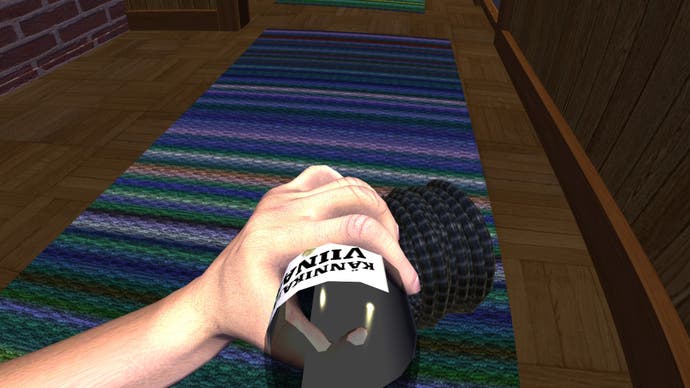
Even the game's off-the-wall humour is inspired directly from Rojola's cultural experiences. When I ask him why his hardcore mechanical simulation is also filled with hard drinking and daft jokes, he says "Simply, answer would be, Finland." But this pragmatism has taken My Summer Car to a fascinating place. What began as a desire to see a driving game with realistic consequences has become an exploration of the meaning of cars in Finnish culture. "It is great to be able to make a game about things that are truly close to me," says Rojola, "And people seem to really appreciate it. While Finnish players feel like coming back to home, other players around the world feel like it is [a] very interesting peek inside an 'exotic' northern culture."
Curiously, this idea of exploring a culture through its relationship with a car is also a major strand of Jalopy's development, and why Pryjmachuk chose the Communist Eastern European setting. "I hadn't seen the setting explored in an apolitical manner. There seems to be an urge with works of fiction, that if the setting is something notable - like communist-era eastern Europe - that you have to provide some form of commentary on it. I didn't want to user an opinion, but instead focus on the day to day of people's lives from that time," he says.
Neither game is yet finished. Pryjmachuk still needs to add two countries to Jalopy (Bulgaria and Turkey) before the game reaches Alpha, while Rojola is hopeful My Summer Car will be completed this year, but it is otherwise opting for a "when it's done" approach. Nevertheless, even at this stage both games offer a strikingly alternative view of how cars can be depicted in a game context. Through each of their road trips, My Summer Car's mundane and yet madcap, Jalopy's quietly pioneering, they reject the homogeneity of mainstream driving games, showing us cars not as disposable toys but indispensable tools, and exploring their significance within specific cultures. They demonstrate that when decoupled from the restrictive trailer of racing and winning, virtual vehicles can take us to extraordinary places.
